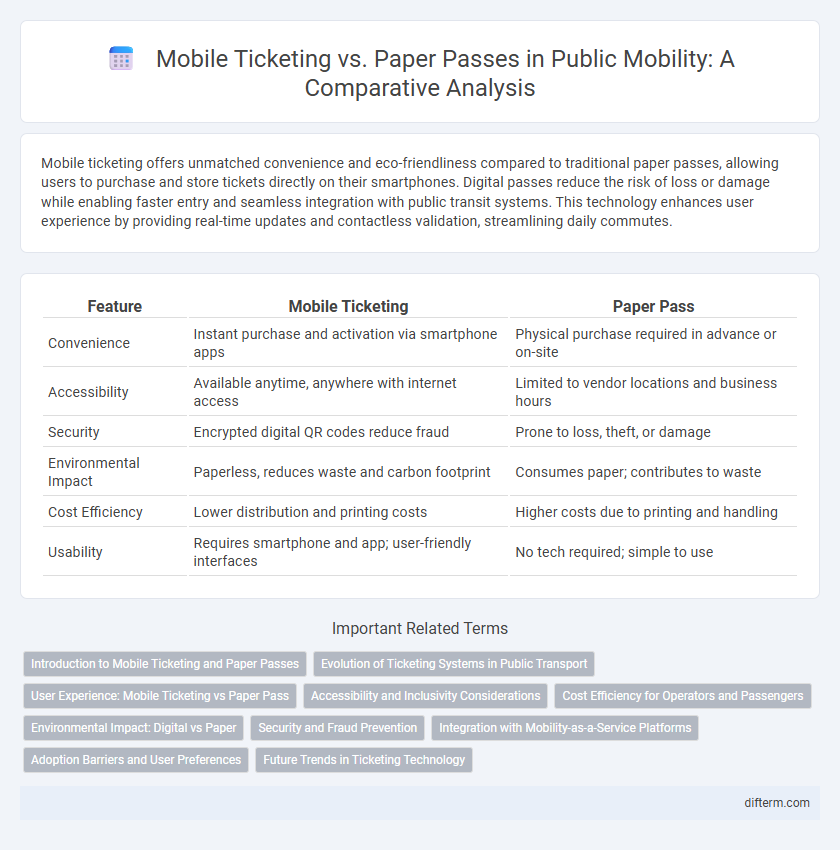Mobile ticketing offers unmatched convenience and eco-friendliness compared to traditional paper passes, allowing users to purchase and store tickets directly on their smartphones. Digital passes reduce the risk of loss or damage while enabling faster entry and seamless integration with public transit systems. This technology enhances user experience by providing real-time updates and contactless validation, streamlining daily commutes.
Table of Comparison
| Feature | Mobile Ticketing | Paper Pass |
|---|---|---|
| Convenience | Instant purchase and activation via smartphone apps | Physical purchase required in advance or on-site |
| Accessibility | Available anytime, anywhere with internet access | Limited to vendor locations and business hours |
| Security | Encrypted digital QR codes reduce fraud | Prone to loss, theft, or damage |
| Environmental Impact | Paperless, reduces waste and carbon footprint | Consumes paper; contributes to waste |
| Cost Efficiency | Lower distribution and printing costs | Higher costs due to printing and handling |
| Usability | Requires smartphone and app; user-friendly interfaces | No tech required; simple to use |
Introduction to Mobile Ticketing and Paper Passes
Mobile ticketing leverages smartphone technology to enable users to purchase, store, and validate tickets digitally, reducing the need for physical paper. Paper passes, traditionally printed and manually inspected, often face challenges such as loss, damage, and environmental waste. Transitioning to mobile ticketing enhances convenience, streamlines fare collection, and supports sustainable urban mobility initiatives.
Evolution of Ticketing Systems in Public Transport
Mobile ticketing systems have revolutionized public transport by offering real-time validation, reduced paper waste, and seamless integration with digital payment platforms, significantly enhancing commuter convenience. Compared to traditional paper passes, mobile tickets provide dynamic fare adjustments and contactless entry that improve operational efficiency for transit authorities. The evolution from paper to mobile ticketing aligns with smart city initiatives, leveraging IoT and mobile technologies to optimize passenger flow and reduce fraud.
User Experience: Mobile Ticketing vs Paper Pass
Mobile ticketing enhances user experience by providing instant access, contactless payment, and real-time updates, reducing wait times and eliminating the risk of losing physical tickets. Paper passes often cause inconvenience due to the need for physical storage, potential damage, and slower validation processes. The seamless integration of mobile ticketing with digital wallets and transit apps further streamlines user interactions, offering personalized and efficient mobility solutions.
Accessibility and Inclusivity Considerations
Mobile ticketing enhances accessibility by enabling users to purchase and display tickets through smartphones, reducing barriers for individuals with mobility impairments or visual challenges through features like screen readers and adjustable font sizes. Paper passes, while tangible and universally accepted, may create difficulties for users with fine motor skill limitations or cognitive disabilities who struggle with handling physical tickets. Inclusive mobility solutions prioritize mobile ticketing systems designed with multi-language support, voice commands, and offline functionality to accommodate diverse user needs and ensure equitable transit access.
Cost Efficiency for Operators and Passengers
Mobile ticketing reduces operational costs by eliminating expenses related to printing, distribution, and physical maintenance of paper passes. Passengers benefit from cost savings through discounted fares and reduced risk of loss or damage associated with paper tickets. This digital shift enhances overall cost efficiency for operators by streamlining fare collection and minimizing fraud.
Environmental Impact: Digital vs Paper
Mobile ticketing significantly reduces paper consumption and waste, lowering the carbon footprint associated with traditional paper pass production, printing, and disposal. Electronic tickets eliminate the need for physical materials and minimize energy use in distribution, contributing to sustainability goals in urban mobility. Adopting digital passes supports eco-friendly transport systems by decreasing resource use and greenhouse gas emissions linked to paper-based ticketing.
Security and Fraud Prevention
Mobile ticketing employs encrypted QR codes and real-time digital validation, significantly reducing the risk of counterfeit passes compared to traditional paper tickets. Advanced authentication protocols and secure mobile payment systems enhance user verification, minimizing opportunities for fraud. This technology also allows for instant reporting and deactivation of compromised tickets, ensuring a higher level of security.
Integration with Mobility-as-a-Service Platforms
Mobile ticketing seamlessly integrates with Mobility-as-a-Service (MaaS) platforms by enabling real-time synchronization of travel data, enhancing route planning and payment consolidation across different transport modes. Unlike paper passes, digital tickets facilitate dynamic updates and personalized offers through MaaS apps, improving user experience and operational efficiency. This integration supports contactless transactions, reducing friction and promoting sustainable urban mobility solutions.
Adoption Barriers and User Preferences
Mobile ticketing faces adoption barriers such as limited smartphone access, concerns over digital security, and inconsistent app usability, impacting user acceptance. Many users prefer paper passes for their tangibility, reliability without network dependency, and ease of transferability among peers. Overcoming these hurdles requires improving digital literacy, enhancing app interfaces, and ensuring robust offline functionality to align with diverse user preferences.
Future Trends in Ticketing Technology
Mobile ticketing is rapidly advancing with features like contactless payments, real-time updates, and integration with smart city apps, enhancing user convenience and reducing paper waste. Emerging technologies such as blockchain and biometric authentication are expected to increase security and reduce ticket fraud in the coming years. The shift towards mobile ticketing supports sustainable urban mobility initiatives and aligns with growing consumer demand for seamless, digital-first transportation experiences.
Mobile ticketing vs paper pass Infographic

 difterm.com
difterm.com